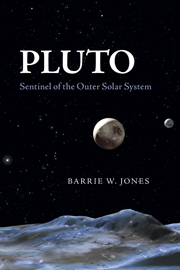Book contents
- Frontmatter
- Contents
- List of tables
- Preface
- Acknowledgements
- 1 The Solar System
- 2 The discovery of Uranus, Neptune and Pluto
- 3 Pluto: a diminishing world
- 4 Pluto's family
- 5 Surfaces, atmospheres and interiors of Pluto and Charon
- 6 The Edgeworth-Kuiper belt
- 7 Is Pluto a planet?
- 8 The New Horizons mission to Pluto (and beyond)
- 9 Pluto: gateway to beyond?
- Glossary
- Further reading and other resources
- Index
1 - The Solar System
Published online by Cambridge University Press: 05 December 2011
- Frontmatter
- Contents
- List of tables
- Preface
- Acknowledgements
- 1 The Solar System
- 2 The discovery of Uranus, Neptune and Pluto
- 3 Pluto: a diminishing world
- 4 Pluto's family
- 5 Surfaces, atmospheres and interiors of Pluto and Charon
- 6 The Edgeworth-Kuiper belt
- 7 Is Pluto a planet?
- 8 The New Horizons mission to Pluto (and beyond)
- 9 Pluto: gateway to beyond?
- Glossary
- Further reading and other resources
- Index
Summary
Though Pluto, and the far-flung depths of the Solar System, is the focus of this book, it is essential that Pluto is placed in the context of the planetary system that it inhabits – our Solar System. In the first place, this is because Pluto is just one of a large and varied number of bodies that orbit the Sun, and cannot be treated as an isolated body in space. Secondly, much of the material in this chapter is needed to support and enhance your understanding of subsequent chapters.
But before we get to the Solar System, I start by examining its cosmic neighbourhood: a vast assemblage of stars called the Galaxy, which we see in the sky as the Milky Way.
A JOURNEY INTO OUR GALAXY
The Sun, which is at the centre of the Solar System, is one of about two hundred thousand million stars that make up the Galaxy. From extensive observations made from Earth it is clear that it has a beautiful form that, face-on, is something like that in Figure 1.1.
The stars, of various kinds, plus tenuous interstellar gas and dust, often woven into stunning forms, are concentrated into a disc highlighted by spiral arms (Figure 1.1). In our Galaxy the disc is about 100 000 light years in diameter (see Box 1.1), and most stars are in a thin sheet about 1000 light years thick – roughly the same ratio of diameter to thickness as a CD. This sheet is called the thin disc.
Information
- Type
- Chapter
- Information
- PlutoSentinel of the Outer Solar System, pp. 1 - 36Publisher: Cambridge University PressPrint publication year: 2010
